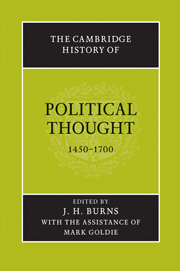Book contents
- Frontmatter
- Introduction
- I Renaissance and Counter-Renaissance
- II Religion, civil government, and the debate on constitutions
- III Absolutism and Revolution in the Seventeenth Century
- 12 Absolutism and royalism
- 13 England: ancient constitution and common law
- 14 Leveller democracy and the Puritan Revolution
- 15 English Republicanism
- IV The end of Aristotelianism
- V Natural law and utility
- Conclusion
- Biographies
- Bibliography
- Index of names of persons
- Index of subjects
- References
12 - Absolutism and royalism
from III - Absolutism and Revolution in the Seventeenth Century
Published online by Cambridge University Press: 28 March 2008
- Frontmatter
- Introduction
- I Renaissance and Counter-Renaissance
- II Religion, civil government, and the debate on constitutions
- III Absolutism and Revolution in the Seventeenth Century
- 12 Absolutism and royalism
- 13 England: ancient constitution and common law
- 14 Leveller democracy and the Puritan Revolution
- 15 English Republicanism
- IV The end of Aristotelianism
- V Natural law and utility
- Conclusion
- Biographies
- Bibliography
- Index of names of persons
- Index of subjects
- References
Summary
The meaning of absolutism
The purpose of this chapter is to describe the main tenets of absolutist and royalist thinking in the seventeenth century. That century, we are often told, saw the making of absolutism, especially in France. There, the Estates General fell into disuse after 1615, and its demise brought death to the principle that taxation requires the consent of the taxed. In the 1620s Louis XIII subdued the Huguenots in a crusade which harnessed militant Catholicism to the service of the monarchy. In the 1630s war with Spain led to a massive increase in the crown's military capacity – and troops could be used to suppress insurrection at home as well as to defeat enemies abroad. The introduction of intendants brought local government under central control, and this development was given added impetus when the intendants assumed military powers. After the temporary setback of the Fronde, royal power resumed its progress, and in the latter decades of the century French absolutism entered its golden age. Louis XIV completed the work of Richelieu and Mazarin. In 1673 the parlement of Paris was formally deprived of the right to remonstrate against royal edicts before registering them. In 1682 the Declaration of the clergy of France unambiguously asserted the independence of kings from papal control in temporal matters.
Elsewhere events often ran a similar course. In 1660 the Danish Estates met for the last time. In 1680 the Swedish Riksdag engineered a constitutional revolution which effectively introduced absolutism. In Prussia the Great Elector taxed without consent and used troops to enforce his will. By the end of the century, we might argue, absolutism was made or in the making in most European states. Even in England its triumph sometimes looked likely, and was averted only by the execution of one king and the deposition o f another. Even in republics — Holland, Venice — there were those who expressed absolutist ideas.
- Type
- Chapter
- Information
- The Cambridge History of Political Thought 1450–1700 , pp. 345 - 373Publisher: Cambridge University PressPrint publication year: 1991
References
- 5
- Cited by

